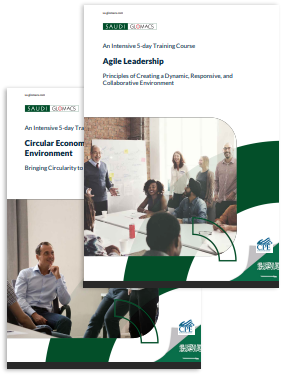An Interactive 10-Day Training Course
The Boston Global Strategic and Operational Management Programme
Sustaining Excellent Performance and
Driving Organisational Change
Course Overview
This GLOMACS training programme will equip you to address two major challenges that we face in contemporary business: the ability to think and plan strategically and to successfully implement those plans by being highly effective, full-range, operational managers. This includes the need to develop ourselves and our people to deal with major changes in markets, competitive structures, technology, operational relationships and organisational structures. These two, fast-paced GLOMACS modules offer you the opportunity to improve your strategic management capability based on the application of leading-edge thinking and best practice in the development of national and international operations.
In addition, it will equip you with the very latest insights, models, tools and skills to boost your effectiveness as a full-range, operational manager, thus helping you to stand out from your colleagues and transform your performance and reputation and those of your department and organisation.
This will be achieved by making explicit both the differences and the complementarities of both managing and leading. The expansive and, sadly, poorly defined art and science of management is one of the least understood and inadequately implemented organisational functions essential to all operations. This pair of GLOMACS modules has therefore been designed to help you cover the full range of management functions using a dynamic, powerful and highly practical new model of management practice that will perfectly complement your enhanced strategic management capabilities.
These GLOMACS modules will highlight for you:
- Structural change in international business and its implications for strategic management
- Aligning strategy, structure, culture and operations
- Developing our teams for the new challenges of 21st century business
- Designing and resourcing strategic plans that can be executed effectively
- Managing the effective execution of strategic plans
- The critical differences between management and leadership and, paradoxically, how they complement each other
- The five pairs of management functions that are required in today's organisations
- The 'meta' core skills that need to be mastered by both managers and leaders
- The psychology of management
- Disruptive new management practices and principles
Modules
This training course is split into two modules:
Module I - The Boston Advanced Strategic Management Programme
Module II - The Boston Advanced Operational Management Programme
Each module is structured and can be taken as a stand-alone training course; however, delegates will maximise their benefits by taking Module 1 and 2 back-to-back as a 2-week training course.
Training Outline
Module 1: The Boston Advanced Strategic Management Programme
DAY 1: Identifying New Opportunities in Global Business
- What does globalisation mean and what are its biggest challenges?
- Why Global Economic and Business Structures are Changing
- Understanding Comparative Advantage and Competitive Advantage
- Managing Transition – What activity belongs where?
DAY 2: New Mechanisms that Support Global Business Development
- Effective Business Models for an Increasingly Integrated Environment
- The Strategic Relevance of the Responsive and Agile Organisation
- Post-merger and Post-acquisition Management as Major Challenges
- Collaboration as a means of Accelerating Global Development
- Product and Process Innovation in Global Strategy
DAY 3: Organisational and Human Resource Development
- The Process of Creating and Managing High-performance Teams
- Developing the New Generation of Potential Senior Managers
- Flexible, Extended and Virtual Organisation Structures
- Mentoring and Coaching – The new roles for senior managers
- The Strategic Implications of the Flattening Organisation
DAY 4: Best Practice in Strategic Management
- Strategic Planning in an Uncertain and Rapidly Changing Business Environment
- The Main Strategic Priority – How to gain and sustain profitable growth?
- Building the Business Model – Achieving the optimum outcome
- Creating an Effective Linkage between Strategy and Operations
- The Concept of Alignment – How to keep your teams focused and on track?
DAY 5: Ensuring Effective Execution of Strategic Plans
- The Framework of an Effective Strategic Plan
- Setting-up and Managing an Effective Strategic Planning Team
- Resourcing the Planning Process and Projecting Inputs and Outputs
- Presenting and Communication the Strategic Plan to Your Operations Teams
- Leading the Execution of the Strategic Plan
- Final Questions, Answers and Deciding Personal Follow-up Actions
- Course Leader’s Summary and Overview of the Whole Course
Module 2: The Boston Advanced Operational Management Programme
DAY 6: Clearly Distinguishing Managing from Leading and Looking at their Shared Core Skills
Defining the Unique, Essential and Noble Functions of Management
- Clearly Differentiating Management from Leadership
- Rediscovering the Critical Importance of Effective Management: Traditional vs. Contemporary Views
- Inappropriate Metaphors of Managers: The Need to Change Mind-sets
- The Key Management Functions: The Q-OPD Full-Range Management Model©
The Four, Over-arching Core Skills for both Managers and Leaders
- Developing Personal, Social and Organisational Awareness
- Tailored, Multi-channel Communication
- Powerful and Targeted Influence and Persuasion
- Emotional Intelligence (EI) & Political Intelligence (PI)
DAY 7: Directing and Delegating: The Heart of Management
Operationalising & Directing
- The Manager’s Crucial Operationalisation Remit
- Translating the Strategic Plan into an Implementation Plan
- Powerful Processes to Direct Your Staff
- Using Goals, Objectives, Outcomes and Behavioural Metrics
Delegating & Problem-solving
- The Delegation Imperative: Making Yourself Dispensible, Creating New Leaders and Succession Planning
- Relinquishing Authority and Responsibility: Setting Your Staff-up for Success
- Creative, Rational and Soft-system Problem-solving Approaches
- Deciding between Alternative Solutions whilst considering the Operational and Political Dimensions of Your Actions
DAY 8: Resourcing and Monitoring: Facilitating Achievement
Resourcing & Supporting
- Identifying the Resources Available to Your Staff and Using Them to Develop their Capability
- Selecting Staff for their Talent and Potential
- Supporting Your Staff: Engagement and Empowerment
- The Five Essential Support Needs of Your Staff to Ensure their continuing Discretionary Effort
Monitoring & Controlling / Coordinating
- The Essential Nature of Monitoring and Controlling
- Soft and Hard Processes: Individual Development and Goal-achievement
- Deciding on Your Key Metrics: ‘What you measure is what you get!’
- Designing Monitoring Systems / Performance Dashboards
DAY 9: Encouraging and Engaging Your Staff
Feeding Back / Reporting & Redirecting
- The Value of Timely, Relevant, Actionable Feedback
- The 3 Feedback Principles and Structuring Motivational, Developmental and Critical Feedback
- Re-directing Behaviours and Setting-up Positive Responses
- Harnessing the Power of Activators, Behaviours and Consequences
The Manager as Catalyst
- Understanding and Appreciating the New Management Paradigm
- Using the Gallup Q-12 to Powerfully Manage your Staff
- Playing to your Staff’s Strengths and Helping them Manage their Weaknesses – as a Team
- Managing Employee Aspirations by Helping them Find their Ideal Roles
DAY 10: Proactively Harnessing Your Talent and Realising Your Full Potential
Managing Your Own Career as a Manager
- Planning in the Emerging, New Employment Reality: The Changing World, Workplace and Corporate Governance
- Identifying Your Specific Career Anchors: What you are good at? What you value and what motivates you?
- Constructing Your Personal Career Advancement Strategy
- Prioritising and Engaging in the Important Career Advancement Activities
- Becoming Politically Adept
Certificates
- On successful completion of this training course, GLOMACS Certificate will be awarded to the delegates
- Continuing Professional Education credits (CPE) : In accordance with the standards of the National Registry of CPE Sponsor, one CPE credit is granted per 50 minutes of attendance
Accreditation

GLOMACS is registered with NASBA as a sponsor of Continuing Professional Education (CPE) on the National Registry of CPE Sponsors. NASBA have final authority on the acceptance of individual courses for CPE credit. Complaints regarding registered sponsors may be submitted to the National Registry of CPE Sponsors through its website: www.learningmarket.org.
All Training Seminars delivered by GLOMACS by default are eligible for CPE Credit.


About Saudi Glomacs
At Saudi GLOMACS, we specialize in delivering world-class training courses in Saudi Arabia and across various international locations. Our training courses are tailored to meet the unique demands of Saudi Vision 2030 and the Human Capability Development Program, focusing on empowering Saudi citizens and enhancing workforce skills. We offer diverse courses spanning leadership, management, engineering, and technical disciplines to cultivate expertise and drive professional growth. Our flexible learning options—whether in-person, online, or in-house—ensure accessibility and convenience for individuals and organizations alike.
With over 30+ years of experience through the GLOMACS global network, we are committed to delivering innovative, results-driven training solutions. Our expert instructors combine industry knowledge with dynamic teaching methods, fostering practical skill development and long-term career success. By choosing Saudi GLOMACS, you're investing in personal excellence and contributing to the Kingdom’s sustainable economic growth and vision-driven transformation.
What do you need to learn next?
Check our list of courses or let us customize a course for you.
View courses


